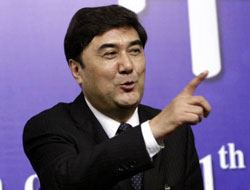Image:

Body:
China has so far convicted 198 people for involvement in deadly ethnic violence last July in what Uighurs call East Turkistan, with more sentencings to come, a top official said Sunday.
"The investigations, prosecution and trials are still going on and the final figure of the people sentenced will be larger," Nur Berkri, the chairman of the region China named "Xinjiang", told journalists on the sidelines of the nation's annual parliament.
The convictions were handed down in 97 separate cases, he said.
Speaking at a rare news conference on the sidelines of the national legislative session in Beijing, Bekri repeated China's claims that deadly July riots in the capital of Urumqi, were orchestrated by overseas activists for the rights of Uighurs.
Nearly 200 people were killed and up to 1,600 injured when unrest exploded into street riots in Urumqi.
He refused to say how many defendants were sentenced to death or how many had been executed, but according to state press reports 26 have so far received capital punishment and at least nine have already been put to death.
Several dozen death sentences have been handed down in those cases but Bekri did not say how many people have been executed.
Most of the names of those sentenced to death appeared to be Uighur, a largely Muslim ethnic minority.
"Work conference"
Nur Bekri insisted that the violence was the work of terrorists, separatists and religious extremists and not linked to China's development policies in the impoverished region.
China has provided little direct evidence to back up the accusation, and those activists have denied involvement in the violence, saying they believe in a peaceful struggle for greater Uighur rights.
Uighur activists say the Urumqi riots, which were followed by retaliatory attacks by members of China's majority Han ethnic group, were the result of decades of pent up frustration with Chinese rule.
Many Uighurs say Han migrants have flooded into the region and receive most of the benefits of government programs and Uighur mineral wealth. The government also enforces strict controls over Uighur culture and religion.
The July violence initially erupted with Uighurs attacking Han Chinese, but in subsequent days mobs of Han roamed the streets seeking revenge.
Uighurs say the violence was sparked when police cracked down harshly on peaceful demonstrations in Urumqi that were held to protest the beating deaths of two Uighur migrant workers at a factory in southern China.
China earlier this year held a work conference to decide future direction in Tibet, which was notable for covering all Tibetan areas, and not just those governed by the Tibet Autonomous Region. The wider scope may be a response to the 2008 uprising.
A similar work conference would be held for Xinjiang, Bekri said, without giving details.
He did not give details on the fate of 20 Uighurs who had sought asylum from the U.N. refugee office in Phnom Penh in December, who were deported by Cambodia back to China.
"The press conference was a pretence to trick outsiders," World Uyghur Congress spokesman Dilshat Raxit told Reuters.
"Uighur people want to decide for themselves how to run their affairs."
